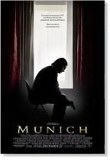|
 Munich: A Thrilling Meditation on Violence
"Munich" is a crackling spy thriller, an epic morality play and director Steven Spielberg's most mature ("Saving Private Ryan" notwithstanding) work to date. It marks the first time Hollywood's champion of populist cinema has allowed significant traces of moral and stylistic doubt to creep onto his palette, and how better to distinguish an artist from a mere showman?
As is the often the case when artists dabble with unfamiliar hues, the effect is striking if erratic. Inspired by the massacre of 11 Israeli wrestlers during the 1972 Munich Olympics and the wave of revenge killings that followed - about which, screenwriter Tony Kushner admits, "nothing is entirely known" - the movie intermittently loses itself in a vast, turbulent cloud of moral equivalence. Moreover, Spielberg has a tendency to strike a too-familiar, self-referential chord: "Catch Me (and Kill Me) if You Can."
Foibles aside, "Munich" survives as a raw, punishing tale of political and personal tragedy, with a spectacular international cast. Eric Bana ("Hulk") brings his long-simmering dramatic talents to a full boil as Avner, an ambitious young Mossad agent who - under the personal directive of Israeli Prime Minister Golda Meir (Lynn Cohen) - is dispatched to Europe to lead a death-squad operation against eight Palestinian dissidents suspected of planning the Olympic kidnapping. (Spielberg doesn't dump his dramatized depiction of the tragedy on us all at once; rather, he sprinkles snippets throughout the movie, keenly alternated with ABC sports announcer Jim McKay's real-life, eloquent reportage.)
Lavishly funded with an untraceable Swiss deposit box that magically stuffs itself with money every month, Avner and his team are anything but seasoned killers. Demolitionist Robert (Mathieu Kassovitz) is trained only to defuse bombs, not make them. Forgery expert Hans (Hanns Zischler) runs an antique shop. Along with Dutch getaway driver Steve (blue-eyed Bond-to-be Daniel Craig) and even-tempered "cleaner" Carl (Ciaran Hinds from "The Sum of All Fears"), Avner convenes the group for regular home-cooked dinners, to discuss strategy and debate ethics. As the killings mount - a phone bombing in Paris, a thrilling commando-strike in Lebanon - the meals become more absurdly lavish, reflecting Avner's gluttonous trail of bloodshed.
Inspired by the novel "Vengeance" by Canadian journalist George Jonas, "Munich" is an intensely bloody meditation on violence. No one on Avner's team doubts that the killings are justified; the burning question is whether Avner can live with himself, or if the assassinations will help preserve a safe and peaceful Israel. Fed information by a deceptively genteel Parisian intelligence-broker (Michael Lonsdale), Avner slowly slips into a self-made hell of paranoia and obsession, capped by the point-blank, coldly gruesome killing of a Mata Hari-style seductress (Marie-Josee Kroze).
In the past, Spielberg has only reluctantly acknowledged sex as a healthy and loving function between two people; typically, it appears as something born from nefarious or adolescent cravings. (Remember the teenage brat poking a finger at Dee Wallace's "sizzling" backside in "E.T."?) No such bashfulness remains in "Munich." Spielberg uses two spousal love-making scenes much the same way David Cronenberg did in "A History of Violence." The first time Avner is with his wife (stunning Israeli actress Ayelet Zorer), the eroticism is warm and naturalistic. Later, after months of bloodshed, it's a poisoned, violent, rock-video affair. Sex as violence.
The scene doesn't really work as a coda to Avner's moral struggle - if anything, it prolongs the film's fundamental uncertainty - but it's impressive nonetheless, showing us why Spielberg, for all his unflagging sentimentality, remains a filmmaker to watch: He's still trying new things.
By Craig Outhier, The Orange County Register
|
 |